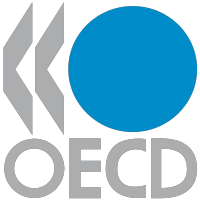The OECD and Israel

Israel has now been admitted to membership of the OECD.

Wikimedia Commons
The idea of Israel being admitted to its membership was first mooted in 1993. The then Israeli Foreign Minister, Shimon Peres, wanted to use the goodwill generated towards Israel on account of the Oslo process as a springboard which might allow Israel to be integrated into the global market. Membership would also give Israel international legitimacy. In May 2007 the OECD formally invited Israel (and four other countries) to open discussions with a view to accession, the negotiations commencing in November of that year. Speaking in Tel Aviv to an audience which included the Israeli President, Prime Minister and Ministers on 1 Nov. 2007, Angel Gurría the (Mexican) OECE Secretary General enthused: ‘It is a triple-win partnership: Israel wins, the OECD wins and the world economy will win too.’ Guria continued: ‘It is a triple-win partnership: Israel wins, the OECD wins and the world economy will win too.’ Guria continued:
For Israel, being part of the OECD will translate into a wide range of opportunities and benefits. As a full member, Israel will join a unique organisation; one that brings together the more developed and some of the most successful countries of the world. The OECD member countries, now counting 30, will share their policy experience and best practices with Israel. Through this process Israel will become an even more appreciated partner in the eyes of international investors; it will be able to discuss the details of its economic agenda and to benchmark its economic reforms with OECD standards. In a nutshell, OECD membership will translate into better policy performance in key areas like trade, investment, innovation, international migration, energy, competition, the political economy of reform or the development of competitive regions, the issue that brought us here today.
It is indeed thought that joining the OECD will ‘boost Israel’s economic standing and help attract investment’ (BBC News, 10 May 2010).
The so-called ‘Roadmap’ for Israeli accession (Dec. 2007) under heading 1 ‘Fundamental Values and Like-Mindedness’ stated:
-
The Council reaffirms that OECD Membership is committed to fundamental values, which
-
candidate countries are expected to share. These fundamental values serve as the foundation of the likemindedness of OECD Members and have been expressed in various OECD Ministerial Communiqués. Accepting these values, along with the established body of OECD instruments, standards and benchmarks, is a requirement for membership. These fundamental values include a commitment to pluralist democracy based on the rule of law and the respect of human rights, adherence to open and transparent market economy principles and a shared goal of sustainable development... During the accession process, the Council may raise questions on these values at any time, in particular in light of discussions in the substantive Committees and other bodies. It may also review regularly a candidate country’s progress towards these fundamental values...
These criteria notwithstanding, Gurria announced that, despite several ‘concerns’, it was likely that Israel would join the OECD. The ‘concerns’ related to: (i) the fact that Israel allows its arms companies to give bribes to help sales; (ii) questions of intellectual property rights, in particular surrounding pharmaceutical companies; (iii) the question of Israeli borders.

(Israeli) Alternative Information Centre
In January 2010 the OECD announced that it expected to ‘complete’ Israeli membership in that year, the crucial vote expected to be taken in May. This was only 15 months after the attack on Gaza, the report on which by the Goldstone Commission having accused Israel of possible war crimes and crimes against humanity and Israel having done little if anything to investigate the matter. (Goldstone). It was moreover within three months of the murder, in January, of Mahmoud al-Mabhouh. (A UK investigation having concluded that there were ‘compelling reasons’ to think that Mossad had used fraudulent copies of ID cards belonging to UK citizens, resulting in the explusion from the UK of an Israeli diplomat.) The Palestinian BDS National Committee issued a passionate appeal (15 March 2010) to the peoples and governments of the OECD member states, cogently arguing the complete incompatibility between international law and the current behaviour of the state of Israel and urging that the OECD should defer Israel’s accession until it could be shown to respect international law and the human rights of the Palestinian people, thus showing commitment to the fundamental values shared by OECD members. It was all to no avail. An invitation to join was duly issued by the OECD and accepted by Benjamin Netanyahu at a ceremony held in Paris on 27 May 2010, the agreement being signed on 29 June and the accession taking place on 7 Sept. 2010 when (according to the OECD website) Israel ‘pledged its full dedication to achieving the Organisation’s fundamental aims’.
Significantly, the Israeli tourism minister tried to use the occasion of the siting in Jerusalem of the first conference to be hosted by Israel after its accession to say that this implied the recognition of that city as the undivided capital of Israel. On this account the conference was boycotted by eight countries (including the UK), many other countries only sending a low-level representative and not their tourism minister. (BDS, Israel and Tourism).